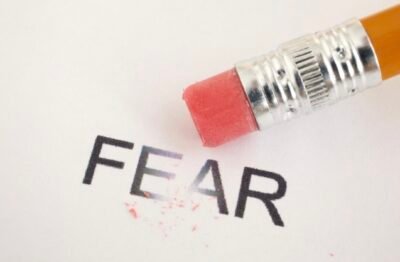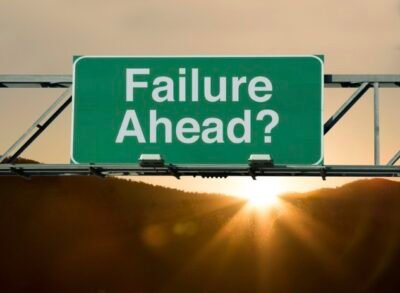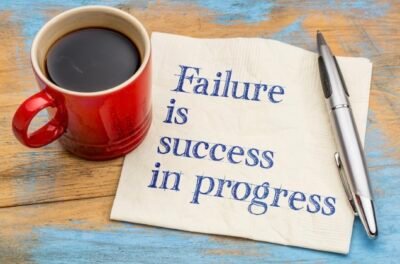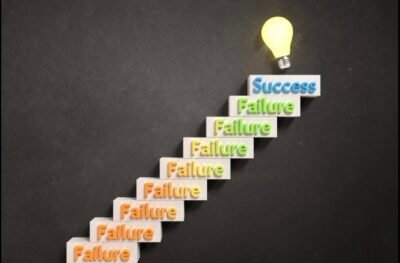
Failure. It’s a word most people shudder at. It’s an experience most of us try desperately to avoid, and in some cases, it’s the defining moment that keeps us from pursuing our dreams.
If value can be found in failure, as countless success stories and personal growth enthusiasts claim, then why does it continue to hold so much power over us?
Even though the thought of failure can feel like the end of the road, a pit of disappointment that shatters confidence. For some people, they view failure as a stepping stone, a necessary challenge on the road to growth and success.
The goal is to become a person who sees failure as an asset and sees it as a valuable part of life.
What Lies Beneath the Fear of Failure?

There are numerous reasons failure evokes fear, and while they may differ from person to person, they often revolve around a few core emotions and beliefs.
1. Fear of Judgment and Rejection
One of the most significant fears tied to failure is the fear of judgment. We live in a world that prizes success and achievement, where social media highlights only the best moments.
People are often afraid that if they fail, others will see them as less competent, less worthy, or even unlikable. Fear of rejection and criticism is deeply rooted in our human psychology.
Failure can feel like it isolates us, as if it marks us as unworthy of acceptance or respect.
2. Perfectionism and Unrealistic Expectations
Many people fall prey to perfectionism—the desire to perform flawlessly in every task. Perfectionists set extremely high standards for themselves, and when they fail to meet these expectations, they interpret it as personal inadequacy.
Perfectionism traps us in a mindset where failure isn’t just undesirable; it’s intolerable. For those who are perfectionists, failure isn’t seen as a step in the process; it’s the final confirmation of their deepest fears about themselves.
3. Lack of Control and Uncertainty
Failure represents the unknown. Even if we understand that mistakes are part of learning, there’s still an unsettling feeling in facing something that might upset our sense of control.
We crave control over our lives, and failing at something important creates an unpredictable environment. We fear that, after failure, we’ll have to confront the unknown: “What happens next?”
4. Past Experiences of Failure
For some, the fear of failure stems from a painful past experience where failure felt catastrophic. Maybe they faced criticism or punishment, or perhaps they endured a period of shame or ridicule after a misstep.
Negative experiences with failure can reinforce the idea that it’s something to avoid at all costs. For these individuals, fear of failure becomes a self-preservation mechanism, a way to protect against the hurt of past mistakes.
Is There Really Value in Failure?

With all this baggage, it’s no wonder failure is so feared. However, if we look at it from a different angle, we can see why people say there is value in failure.
1. Failure as a Teacher
One of the most significant values of failure is its ability to teach us things success cannot.
Success might feel good, but it rarely forces us to analyze our approach, reassess our decisions, or make adjustments to our strategy.
Failure demands that we examine our efforts, find the gaps, and refine our methods.
Entrepreneurs often face multiple failures before they achieve success. Thomas Edison famously stated that he didn’t fail but found “10,000 ways that won’t work” when inventing the light bulb.
Failure is an educator that offers insights that success can’t.
2. Building Resilience
Resilience is the ability to bounce back from adversity, and it is a trait that failure helps us to cultivate.
People who have experienced failure and learned from it develop a thicker skin and are more equipped to handle setbacks in the future.
Life’s challenges become easier to face because they’ve learned not to crumble under the weight of a single setback.
The value in failure lies not in what we learn from it, but in how it builds our inner strength and fortitude.
3. Developing Empathy and Humility
If we allow it, failure can foster empathy and humility. When we fail, we’re often reminded of our limitations, which makes us more compassionate towards others who are struggling.
People who have never tasted failure can sometimes come across as arrogant or disconnected from others’ struggles. However, experiencing failure humbles us, grounding our expectations and deepening our ability to understand others’ pain.
4. Creativity and Innovation
Failure has the ability to spark creativity. When one approach doesn’t work, we’re forced to think outside the box and come up with new solutions.
Many groundbreaking innovations have come from someone who was willing to push past failure, experiment, and explore alternatives.
Creativity thrives in the face of limitations, and failure provides the constraints necessary for truly innovative thinking.
5. Increasing Self-Awareness
Failure can reveal parts of ourselves we may not have noticed before.
When we fail, we’re often confronted with aspects of our character, skillset, or thought patterns that require examination.
Failure might highlight a personal weakness, like procrastination or lack of attention to detail, which we can then work on improving.
By uncovering these areas of improvement, failure enhances self-awareness, allowing us to grow into more well-rounded individuals.
Changing Our Relationship with Failure

So, if failure has so much value, how can we shift our mindset to view it positively? Here are some practical ways to reframe our fear of failure and start embracing it as a tool for growth.
1. Redefine Success and Failure
One reason failure affects us so much is because we equate it with defeat. What if we defined success not as a single outcome, but as a commitment to keep moving forward, regardless of the results?
By changing our definition of success to include effort, learning, and resilience, we start to see that failure is not an end, but rather a part of the journey.
The success stories of many prominent figures often include numerous “failures” that ultimately helped shape their path.
2. Practice Self-Compassion
Being kind to ourselves when we fail can make a significant difference in how we process failure. Instead of beating ourselves up, we can remind ourselves that mistakes are a natural part of growth and learning.
Treating ourselves with compassion allows us to see failure as a valuable lesson instead of a mark against our character.
Self-compassion fosters a growth mindset, the belief that abilities and intelligence can be developed through dedication and hard work.
3. Focus on the Lessons, Not the Loss
When failure strikes, try to focus on what you’ve learned rather than what you’ve lost.
Ask yourself constructive questions: What could I have done differently? What did this experience teach me about my strengths and weaknesses? What can I do next time to improve?
Shifting your focus to what you gained through the experience makes it easier to move forward without lingering on the loss.
4. Remember That Failure Is a Process
Failure isn’t a one-time event; it’s often a process.
Embracing that process means understanding that setbacks and mistakes are likely to happen repeatedly, especially in challenging pursuits.
Knowing this can make us more resilient, preparing us to handle small defeats without letting them undermine our larger goals.
Stories of Famous Failures

For inspiration, here’s stories from a few well-known people who encountered failure and benefited from from it as well.
1. J.K. Rowling
Before her success with Harry Potter, J.K. Rowling faced numerous rejections from publishers. She was struggling financially and almost gave up on her writing.
Each rejection pushed her to hone her craft of writing and learn more about the publishing process. Today, she’s one of the most successful authors in the world, which is a testament that failure doesn’t have to stop us from achieving our dreams.
2. Steve Jobs
Steve Jobs, co-founder of Apple, faced a massive career setback when he was fired from his own company. Rather than letting this failure define him, Jobs used it as an opportunity to grow and innovate.
During his time away from Apple, he founded NeXT and acquired Pixar, which ultimately became a game-changer in the animation industry.
When he returned to Apple, he brought new ideas and experiences that helped transform the company into a global powerhouse.
3. Oprah Winfrey
Oprah’s career began with several rejections and a demotion from her first television reporting job.
Rather than let these setbacks define her, she used them as a catalyst to find her true passion—connecting with people on a personal level.
Today, Oprah is one of the most influential figures in media, known for her empathy, insight, and resilience.
Embracing Failure As Part of Success

How do we embrace failure? The answer lies in how we perceive and approach failure.
The answer to overcoming the fear of failure isn’t to avoid it—it’s to embrace it, to redefine it, and to let it propel us forward.
To become the best versions of ourselves, we must be willing to face failure head-on, to acknowledge it as part of the journey rather than a dreaded detour.
We all fail. Every day, in big ways and small, we face moments that don’t go according to plan.
And in each of these moments, there’s a lesson waiting to be discovered, a hidden strength to uncover, and a reminder of our ability to grow.
As we navigate our lives, remember that failure is not a full stop; it’s merely a comma. It’s not an end but a beginning. And maybe, just maybe, that’s where its true value lies.
